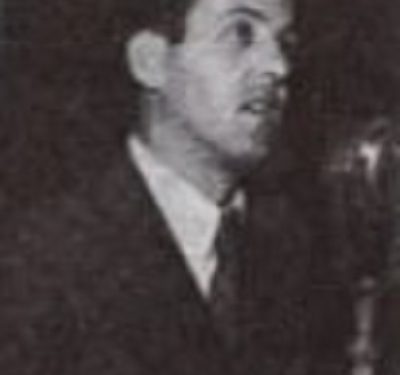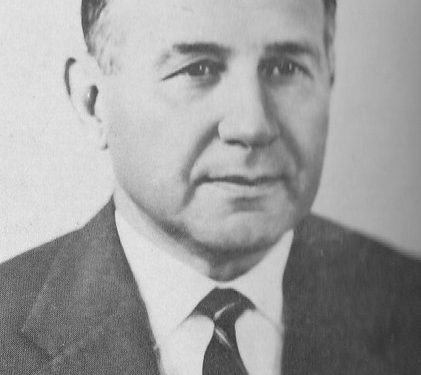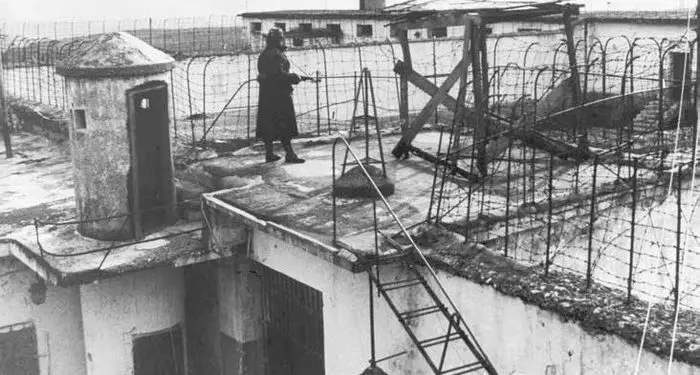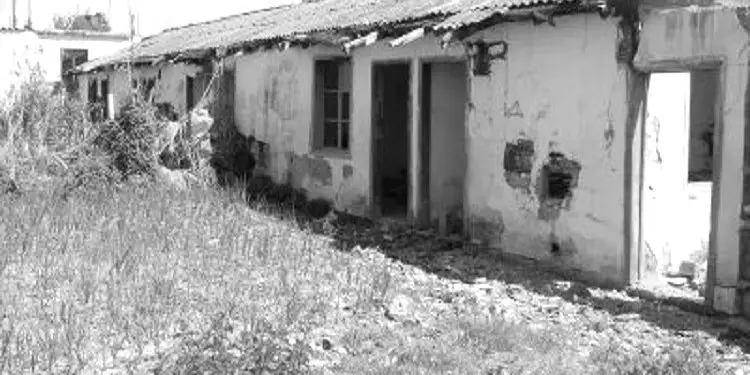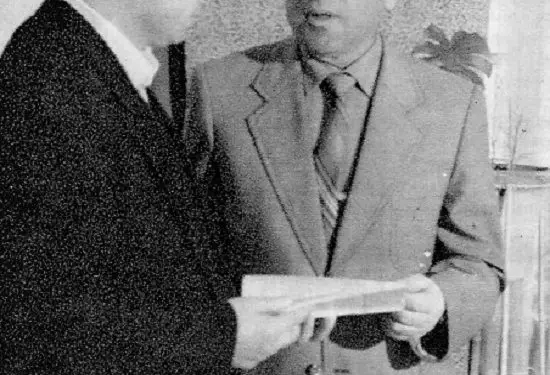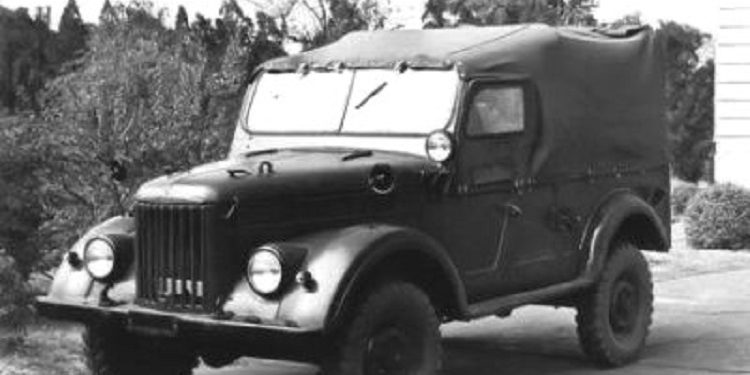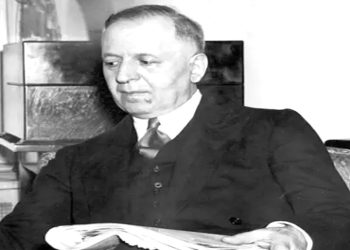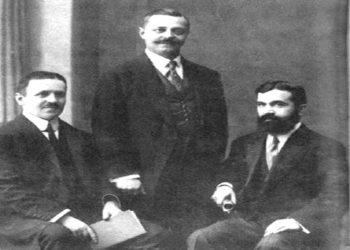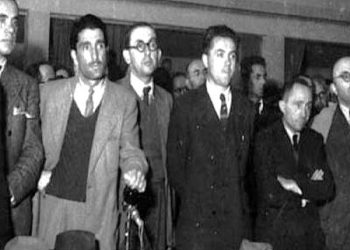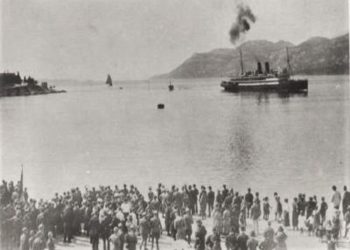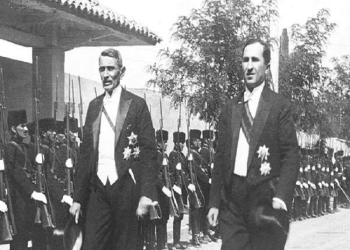Part Two
Who was Llazar Papapostoli?
Memorie.al. Born in the village of Ziçisht – Bilisht, in May 1915, son of Fotini and Dhimitri. He completed primary school in Ziçisht. From 1927–1930, he worked at the “CEKREZI” Printing House in Tirana. In 1930, he received a scholarship to the American Technical School in Tirana. In 1937, he went to the USA and enrolled at the University of “ILLINOIS,” in the department of Political and Social Sciences. He graduated in June 1941. He was unemployed until January 1942. From January 5, 1942, until June 1943, he worked as secretary of the “Free Albania” Association and director of the newspaper “LIRIA” in New York. In June 1943, at the invitation of Mr. Francis Calleny, he went to Washington, to the O.S.S.
From September 1943 to October 21, 1943, he served in Cairo, with the O.S.S., and at the end of October in Bari, Italy, serving the O.S.S. as a substitute for Major Coon, until Harry Fultzi arrived. Placed in the “Azzon” villa as responsible not only for materials and equipment but also for the membership of Albanians and as a lesson instructor. At the end of October 1944, he left for Albania, with the Albanian Mission near the General Command of the National Liberation Army. A classmate of Mehmet Shehu at Fultz’s Technical School in Albania, he immigrated to America in 1937. In 1943, he participated in the O.S.S. where he gained the pseudonym “Larry Post.” “Larry Post,” an officer of the American secret service, with the rank of major, was Llazar Papapostoli from Ziçisht of Korça, whose life would take another course as soon as he decided to return to Albania in 1944.
Continued from the previous issue
For the first time, Llazar Papapostoli’s wife spoke to the press about life on the “Liberation” farm, in the internment camp in Shtyllas, Fier. How “Larry Post” died, the wife’s doubts about the hole in the back of his head, what the investigation sought from Liza after the death of Mehmet Shehu?! What did Ramiz Alia and Nexhmije Hoxha say about the American secret service major?!
Liza Papa (Papapostoli), a charming woman with a small body, communicates perfectly accurately, with clear logic far from extremes, so her 74 years of age do not show. In the apartment near the Tirana Court where she lives, the arrangement of which touches the antique with the modern, she welcomes you without any shyness. She says with a laugh that the tastes for the use of wood and paintings everywhere in the house were those of her son Rudolf and his wife. Granddaughter of the Kasnecis and daughter of the Labos, she experienced the strongest pain when, in the last year of Pedagogical school, along with two or three other friends, she was on the verge of being expelled from school.
It was the time when BRASH led the movement against young people who came from anti-conformist ranks. Jolanda Labo (Liza Papa), with a father sentenced to life imprisonment, with a imprisoned brother, Llambro, during the storm of arrests in 1953, after the death of Stalin, began to help her mother, working with a sewing machine at home. “This was to support the family, because not only was my father sentenced to life in prison, but they took everything we had, our property,” says Liza.
At the end of 1956, she became the wife of “Larry Post,” the American secret service officer, who had been released from Tirana prison for almost a year, where he was sentenced for 10 years, eight of which were spent in solitary confinement in cell number 1. “I had heard about an American who had stayed and been imprisoned, as much information as we could get in those years, within our circles. I became convinced of a smart man and certainly with democratic convictions, just as I was, just as my family was. So, when he came to our house and, after I informed my brother when I went to Zadrima, where the field canal was being built by the convicts, I finally decided,” recalls Liza.
Thus, Liza Papa enters the life of the man with a career in the American secret services, building a family with two children in internment, persecuted and surveilled under the pressure of the scenarios of that time. She lived with “Larry Post” until the end of his life in Shtyllas of Fier, where she says they killed him. What did Liza learn from her husband, “Larry Post,” or Llazar Papapostoli? What was the life she led on the “Liberation” farm for five years and then in the internment camp in Shtyllas of Fier? Who met with “Larry Post” and how did he die? Why was Liza interrogated by investigators from Fier and the Ministry of the Interior after the death of Mehmet Shehu, when Kadri Hazbiu and Feçor Shehu were on trial?!
Why did Ramiz Alia say that “Larry Post” had been set free, while in Nexhmije Hoxha’s memoirs, the American secret service officer had been extradited to America? The doubts and facts about her acquaintance and life with Larry Post are told by his wife.
Mrs. Liza, how did you meet your husband Llazar Papapostoli (Larry Post)?
I had heard about an American named “Larry Post” who was not allowed to return and was kept in prison. I thought of an intelligent, educated man, with democratic principles, principles that were part of me and my family. So, for me, this person had become known based on information we received in our circles, where we discussed the political situation at that time and many other things. My family was being punished, my father had been sentenced to life imprisonment, and my brother was also imprisoned, a man who was the first to be expelled from Albanian schools for anti-conformist ideas.
In these circumstances, Llazi’s visit to my house also happened, as he had met Llambro (my brother) in prison. I decided to marry him without any regret, I told the family, and it was decided. Meanwhile, Llazi had been forced to leave for his village in Korça, in Ziçisht, but from there he was sent to internment on the farms of Fier, where they again tried to make the same accusation for which they kept him in Tirana prison. My married life, where two children were also born, my daughter Greiss and my son Rudolf, began on the “Liberation” farm and ended in Shtyllas of Fier, as an internee inside a room, three by four.
When you got married, what did “Larry Post” tell you more about his life abroad and in the country?
On rare occasions, he could talk to me about something. I certainly learned that since he was 10 years old, he had been brought to Fultz by an uncle of his, who told him to try it. If Llazi would walk, he would leave him in school, otherwise, he would take him three days later. But it happened that Fultz said; “Are there other students like this?” My husband himself told me this. In America, he is taken by his uncle and Kosta Çekrezi, a very well-known figure, makes Llazi the director of the newspaper “Iliria.”
In America, he graduated from the University of Illinois, in the department of Political and Social Sciences. He decided to return to Albania in 1944, for which he told me that he gave up work to continue in his country. But they did not let him return, while he was receiving messages that he would be killed, and they arrested him in 1946. You can talk a lot about Llazi, but it depends on what you are looking for.
How was “Larry Post” as a husband?
I will gladly talk about this. Even if the situations were different, I would not have had the chance to know a man like him. Educated, intelligent, who never complained, and very hardworking. Within the walls of my room, I have lived a precious life. “Larry Post” was truly a wonderful man and husband.
Your husband stayed in prison for ten years, 8 years in solitary confinement in a cell. Did you learn anything about why this happened?
Now, after the change of systems, much more has been learned than we knew at that time. But I am telling you the few things he told me. In one instance, from the tortures in the cell, he even managed to cut the veins of his hands; he tried to commit suicide. His voice came back late, as Llazi told me, they put wood in his throat, so much so that they damaged his vocal cords. It was the time when Koçi Xoxe was asking him to speak against Enver Hoxha, as if “Larry Post” was the envoy of the American Secret Services. He himself spoke during the investigation about what legal position he had with the O.S.S. and why he had decided to come to his country.
They asked him to give up his American citizenship, and Llazi told me that he did not accept it and that they wanted an anti-American trial. This also happened to him after he was imprisoned in Korça. They staged it as if Llazi would escape and started again the same way of pressure they had put on him in prison. “If you continue like this, you will get the same things you have received for so many years from me. And, if you don’t give up, you’d better shoot me,” Llazi told me. Then, the Korça Branch decided to intern him in Fier, with approximately the same charges for which he was put in prison; from participation in the fascist terrorist organization to those for assassination attempts against the leaders of the government of that time.
Has your husband ever talked to you about the politics and leaders of that time?
I emphasize once again, Llazi spoke very little and in no case about topics that could create more problems for us, where we were. But I remember that one day he told me: “These are a bunch of wolves, which will tear each other apart.” This happened, and I often think that when Llazi told me this, you could have little opportunity to analyze the situation.
We return to the death of “Larry Post,” how did it happen?
Llazi or as he is known “Larry Post,” was killed, he did not die. Why would you say?! I am telling you what I know and what I have learned about this event. That day I had to work far away in the rice fields in Bashtova. I remember that Llazi had cooked mushrooms and I, knowing that he was on the way, said; I will take this food. He cooked very well, he was a specialist, as he knew the field of agriculture well, especially vegetables, and could make any kind of food plate. In America, he had Jewish friends and as a bachelor, they learned to live alone, but I was worried about him. The night before, Drita Kosturi had told him that she would also go to Pojan of Fier, to do some small shopping.
Later I learned that she had not gone. It was ten in the morning, when they sent me word that Llazi was in the hospital. I thought he might have a heart problem, because a year earlier, he had entered a cafe there in the village and as soon as someone gave him a cigarette, he had serious problems. And I was constantly worried about this fact. On the way back, a woman comforts me. That’s when I found out that Llazi had died. They had prepared the house, and my mother went to dress him, as she was the most skilled in this regard. I remember that when they returned the clothes to me, his jacket that was found where he had died was all blood.
I washed everything and folded it. Today I regret this. At least I had that jacket for a souvenir; I would have kept it…! When my mother came home she told me that Llazi had a hole in the back of his head. “When I lifted him to dress him, at the bottom of his head there was a hole, where my finger went in,” she told me. Then we thought he was killed and not as they told us, that he died of a heart attack. The place where he died, leaving Pojan to go to Shtyllas from the mountain, has a part that passes near the fence and is up and down. On the way back, Llazi had been seen entering that type of valley, but not leaving. At that moment, others told us, only one man on a bicycle had passed. That man never came out and never showed up, and I didn’t look for him either.
It could have been the person who might have shot him. I remember that Remzi Ndreu told me that when he went to the place only a short time after Llazi had died, he found people from the branch, from the prosecutor’s office there. “As if they had sprung from the earth,” they told me. What else can I tell you about that day? Ah, I remembered when we took out the body to bury him; I saw Llazi’s strained face, where his prosthesis had moved. This impressed me for the moment. Later it was discussed at length and I am convinced that he was killed.
Do you know anything about the letter that Larry had sent to Hasan Reçi and was found in Mehmet Shehu’s safe, after his death?
Llazi did not tell me in detail. But I remember that once he told me that when Hasan Reçi saw him in Tirana, he was scared. “What are you doing here, Llazi, they will kill you,” Hasan had said. He told me that this man was very scared, almost to death, but I didn’t know that person at all, who had been shot. The letter to Hasan Reçi came from Bari, at the time when Llazi was Fultz’s substitute. Maybe it was precisely for this letter that he had to be in that state. Later we learned that this was found in Mehmet’s safe. Also, after Mehmet’s death, they interrogated me.
Who interrogated you and what were they looking for from you?
After Llazi died, I requested to leave Shtyllas and join my family in Rrogozhina, where my children were staying. They gave me permission, but without the right to get a house. I remember that after Mehmet’s death, or more precisely, at the time when the trial for Kadri Hazbiu and Feçor Shehu began, they called me to the office of the chairman of the Rrogozhina Committee. There I was interrogated by a man from the Fier Branch, whom I had known before, because he dealt with the internees, his name was Basri, from Shkodra.
He told me: “When did you come to Rrogozhina? Why do you say Llazi died? Have you seen foreigners meet with him, or not?” Of course, I would tell what I knew, but I did not understand what was happening. I told him that; where are there foreigners in internment, but he talked to me about a Kosovar. He is not called a foreigner I said, while he was asking me. Llazi had told me that a Security officer had gone and asked for watermelons in the name of Mehmet Shehu.
Could Mehmet ask for watermelon from “Larry Post”!? And Llazi told me: The dog is not leaving me alone! We return to this Basri, who in the end said this: You didn’t help us, your husband had a hole in his head. Then he left…! The second time a man from the Ministry of the Interior came to me, a short man. I didn’t know him; he also asked the same questions, but not to tell me like Basri, that Llazi had a hole in the back of his head.
It appears in the press that Ramiz Alia, at the trial of Kadri Hazbiu, spoke about the letter, as he said that “Larry Post” had been set free. While Nexhmije Hoxha in her last book, said that Post was extradited. What do you think about this?
I have also read them. I believe that they really could not have known what happened to “Larry Post,” because there is no way they can make such a statement! My son, Rudolf, replied to Nexhmie in the press about this, but she did not react. This is terrible, “Larry Post” was sentenced to prison, tortured, interned, killed, and from what we read, Alia and Hoxha knew he had returned to America!
THE SITUATION IN ALBANIA – ALBANIA-U.S. RELATIONS
In the first message of this material (telegram 711.75/ 1-2046 dated January 29, 1946), Jacobs writes to the Secretary of State (following what is understood from previous messages) that: “… I present the growing unsociable feeling of the regime here towards the USA.” He points out that: “For our prestige towards the Soviets, various activities are taking place in Albania.” It is emphasized that; “The Soviet Legation is complete, almost all members are here with their wives, that they live in five houses”…
“These officials, mainly military, are often seen in public places with Albanian officials…” that: “There are also many Soviets in the city, who are said to be technicians (… there are several hundred)… And others are expected to come…”! “… Within the government itself, a pro-Yugoslav and pro-Soviet group is emerging…!” To orient the new Constitution according to the Soviet line. This has aroused a spirit of opposition among the moderating radicals… The quarrel caused the arrest of the members of the so-called opposition, such as Kokoshin, Asllani, and Larry Post (alias Llazi Papapostoli)…
Regarding this, Enver Hoxha writes: “Even before Albania was liberated; a certain Llazar Papapostoli had come from America, with the Americanized name “Larry Post.” This would serve as a political advisor to the American mission and at the same time, would connect with the old agents to lay the first foundations of espionage and saboteur groups. But these groups took organized form, especially with the arrival in March 1945 of Mr. Fultz, who took over their leadership himself. (page 390)…” “These goals were admitted by these enemies themselves before the court, they themselves publicly admitted that the headquarters of the Anglo-American mission had been transformed into workshops where plots, assassination attempts and sabotage were concocted, where plans for armed attacks and landings from abroad were drawn up (page 390)…! Memorie.al




